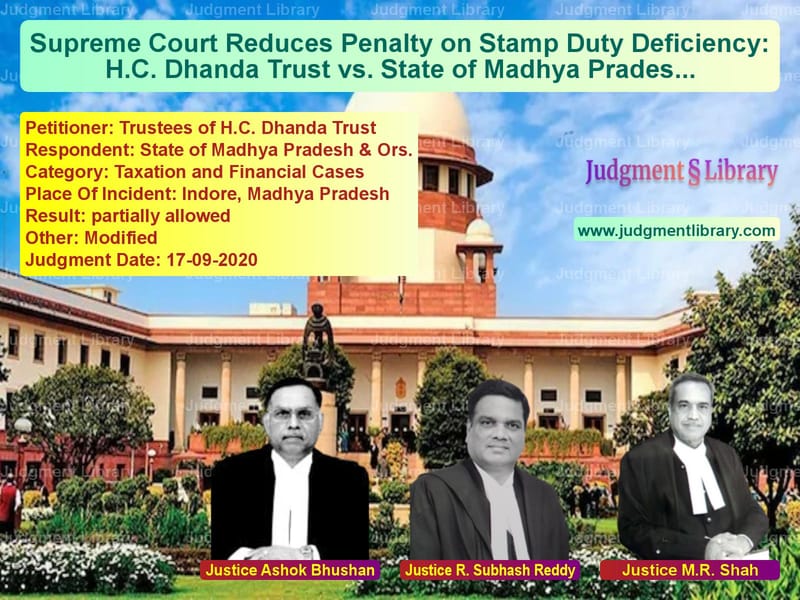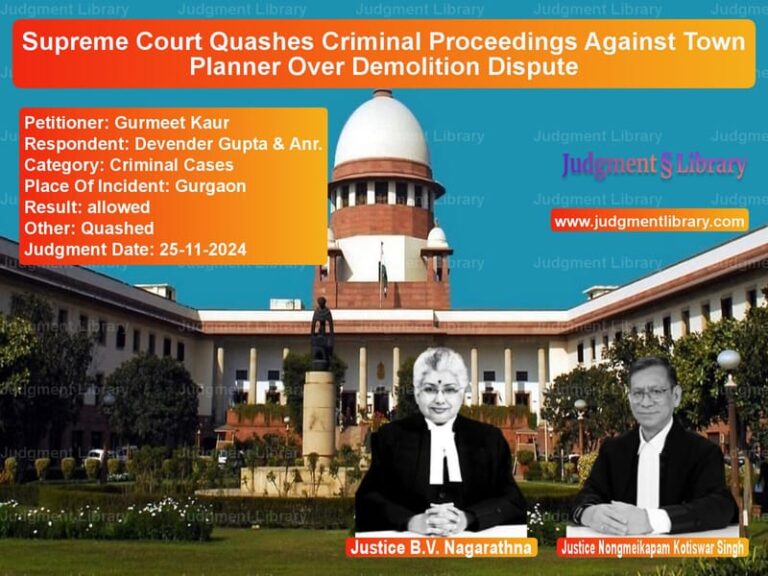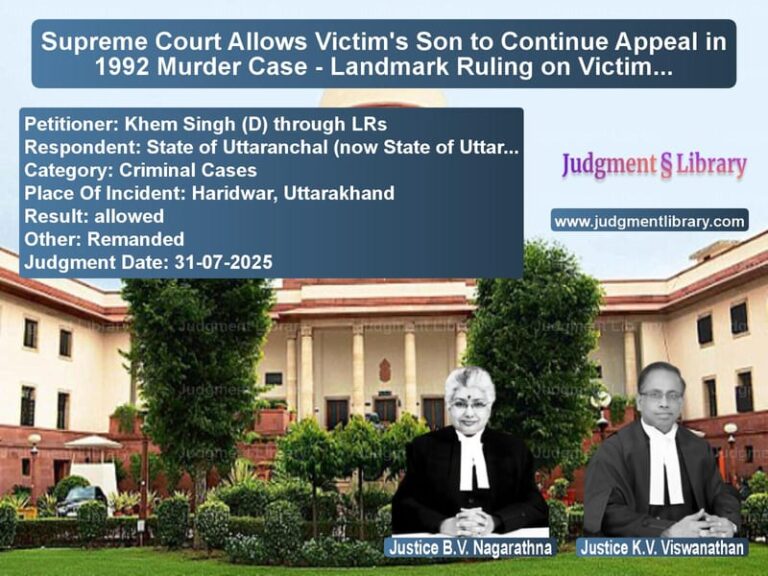Supreme Court Reduces Penalty on Stamp Duty Deficiency: H.C. Dhanda Trust vs. State of Madhya Pradesh
The case of Trustees of H.C. Dhanda Trust vs. State of Madhya Pradesh & Ors. revolves around a dispute regarding the imposition of ten times penalty on stamp duty deficiency under the Indian Stamp Act, 1899. The Supreme Court was called upon to decide whether the Collector of Stamps had acted reasonably in imposing the maximum penalty and whether such a penalty was justified in the given circumstances.
The appellant, a trust created under the will of the late Shri H.C. Dhanda, challenged the Madhya Pradesh High Court’s decision upholding the penalty. The Supreme Court, while accepting that a penalty was applicable, reduced it from ten times to five times the deficient stamp duty.
Background of the Case
Shri H.C. Dhanda, a former minister in the Maharaja Holkar Government of Indore, had received a free grant of land measuring 108,900 sq. ft. in Indore in 1946. Over the years, he acquired additional properties, including ‘Hotel Lantern’ and another property at Ravindra Nath Tagore Marg. In his will dated October 26, 2002, he created a private trust and appointed his son and two others as trustees. He passed away on July 5, 2003.
On April 21, 2005, the trustees executed a Deed of Assent to transfer the properties to the trust beneficiaries. The Collector of Stamps, however, treated the deed as a ‘gift deed’ and imposed a stamp duty deficiency of Rs. 1,28,09,700 along with a ten times penalty amounting to Rs. 12,80,97,000. The total amount demanded was Rs. 14,09,06,700.
Petitioner’s Arguments
The appellant trust, represented by Senior Advocate A.K. Chitale, contended:
- The Deed of Assent was not a gift deed but a document executed in compliance with Sections 331 and 332 of the Indian Succession Act, 1925.
- The transfer of property was in line with the will and did not amount to a new transaction attracting stamp duty.
- The penalty imposed was excessive and disproportionate, especially when there was no deliberate attempt to evade stamp duty.
- The Collector failed to provide valid reasons for imposing the maximum penalty of ten times the deficiency.
Respondent’s Arguments
The State of Madhya Pradesh, represented by Solicitor General Tushar Mehta, argued:
- The document was rightly classified as a gift deed, making it subject to stamp duty at the prescribed rate.
- The trustees had intentionally misclassified the document to evade stamp duty.
- The Board of Revenue had upheld the penalty, finding that there was a clear suppression of facts.
- The Collector had the discretion under Section 40 of the Indian Stamp Act to impose up to ten times the deficient duty as a penalty.
Supreme Court’s Key Observations
The Supreme Court analyzed the nature of the penalty under Section 40 of the Indian Stamp Act, 1899. It observed:
“Whenever a statute grants discretion, it must be exercised in a reasonable manner. The penalty of ten times the deficiency is not automatic and must be justified based on facts.”
The Court further noted:
- The phrase “if he thinks fit” in Section 40(1)(b) gives the Collector the discretion to impose a penalty up to ten times but does not mandate the maximum penalty in every case.
- The imposition of penalties should be based on factors such as deliberate evasion, fraudulent intent, and financial impact on the government.
- The Collector’s order lacked sufficient reasoning to justify the extreme penalty of ten times the deficient amount.
- While there was an attempt to pay less stamp duty, it was not a case of fraud or deliberate misrepresentation.
Legal Precedents Considered
The Supreme Court relied on several precedents, including:
- Gangtappa vs. Fakkirappa (2019) 3 SCC 788: Held that penalty should be imposed only after considering all circumstances.
- Peteti Subba Rao vs. Anumala S. Narendra (2002) 10 SCC 427: Stated that the ten times penalty should be imposed only in extreme cases.
- State of Uttar Pradesh vs. Sabir Ali (1964 AIR SC 1673): Confirmed that judicial review applies to excessive penalties imposed by revenue authorities.
Final Judgment
The Supreme Court modified the Collector’s order and ruled:
“Taking into consideration all facts and circumstances, we find that the penalty of ten times the deficient stamp duty is excessive. The ends of justice will be served by reducing the penalty to five times the deficiency.”
The penalty was reduced from Rs. 12,80,97,000 to Rs. 6,40,48,500.
Implications of the Judgment
This ruling has important implications for stamp duty assessments and revenue proceedings:
- It reinforces the principle that penalties should be proportionate to the degree of violation.
- It clarifies that the maximum penalty of ten times is not automatic and must be justified.
- It highlights that revenue authorities must provide adequate reasoning when imposing extreme penalties.
- It ensures that tax administration remains fair and does not act oppressively.
With this judgment, the Supreme Court has emphasized the need for reasoned decision-making in revenue matters, ensuring that penalties are imposed fairly and justly.
Petitioner Name: Trustees of H.C. Dhanda Trust.Respondent Name: State of Madhya Pradesh & Ors..Judgment By: Justice Ashok Bhushan, Justice R. Subhash Reddy, Justice M.R. Shah.Place Of Incident: Indore, Madhya Pradesh.Judgment Date: 17-09-2020.
Don’t miss out on the full details! Download the complete judgment in PDF format below and gain valuable insights instantly!
Download Judgment: Trustees of H.C. Dha vs State of Madhya Prad Supreme Court of India Judgment Dated 17-09-2020.pdf
Direct Downlaod Judgment: Direct downlaod this Judgment
See all petitions in Customs and Excise
See all petitions in Tax Evasion Cases
See all petitions in Property Disputes
See all petitions in Judgment by Ashok Bhushan
See all petitions in Judgment by R. Subhash Reddy
See all petitions in Judgment by Mukeshkumar Rasikbhai Shah
See all petitions in partially allowed
See all petitions in Modified
See all petitions in supreme court of India judgments September 2020
See all petitions in 2020 judgments
See all posts in Taxation and Financial Cases Category
See all allowed petitions in Taxation and Financial Cases Category
See all Dismissed petitions in Taxation and Financial Cases Category
See all partially allowed petitions in Taxation and Financial Cases Category







